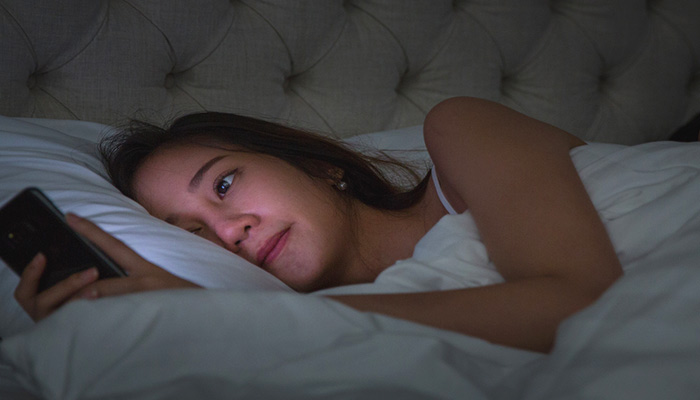There’s good evidence to show that using mobile phones, tablets or computers - and even watching TV - when we go to bed can interfere with our normal sleep processes.

Bad idea: phones or other electronic devices in bed can be a problem because they stimulate rather than relax the brain.
The worst offenders are mobile phones and tablets, or any connected devices that can access the internet – which are so often in our bedrooms these days.
Sleep specialists will tell you that the bed should be for sleeping and perhaps for other bedtime goings-on, but not for normal waking activities.
We know that sleep is a really important function for our bodies and has a huge impact on our mental and physical health. While we sleep, our brains form new pathways to help us learn and remember, to allow us to solve problems, make decisions, and to be creative.
Poor sleep can affect our intellectual performance, our emotional control and behaviour, and our ability to cope with stress. Tired children and teenagers can have anger and impulse control issues and can have difficulty getting along with others.
Too tired to learn
If you are in a learning environment, which most children and adolescents are, it is even more important to sleep well because research shows that you need two consecutive good nights of sleep to learn things. If you try to learn when tired you may be past the ‘cognitive tipping point’ where, although you are going through the motions of learning, the brain doesn't really take in the information you receive.
Sadly, many tired teens don’t get enough dream sleep to learn well.
Even when information is learned initially, further good sleep is needed, as learned information is ‘filed’ into long-term memory during REM (dream) sleep. Sadly, many tired teens don’t get enough dream sleep to learn well.
Mobile phones and other devices can affect our sleep in a number of ways.
First, if you go to bed and start to do the things you normally do while you’re awake during the day, such as browsing your social media or emails, you start sending mixed messages to your brain. Your brain stops associating the bedroom just with sleeping. That then makes it more difficult for you to go to sleep in the first place.

Ditch the devices: Dr Wayne Warburton says using mobile phones in bed sends 'mixed messages' to your brain.
Another reason that using your phone or other electronic device in bed can be a problem is that it typically stimulates rather than relaxes the brain. This is further aggravated by interacting with content that arouses us and releases neurotransmitters like adrenaline (e.g., watching a scary show or reading a social media post that annoys you).
Phone-free bedrooms
Also, these devices emit short-wavelength light, which interferes with the body’s production of the sleep hormone melatonin, and does this most strongly when devices are close to the face. Using devices in ‘night mode’ may reduce this effect somewhat, but they still emit some light and can also distract the person trying to sleep.
Finally, these devices often make noises and alerts through the night, which your brain has been conditioned to respond to.
A highly-regarded sleep expert, Dr Chris Seton, suggests four important things parents can do to help children and teenagers improve their sleep.
First, speak to them about the importance of a good night’s sleep –make them aware of the simple idea that good sleep is needed for healthy development and learning.
- Let's get that bread: How teenagers change language
- Faster, higher, emotionally stronger: risks help kids avoid anxiety
Second, establish a good sleep routine which begins with a relaxing activity half an hour before bed time. You’re aiming to move away from adrenaline-raising activity and excitatory neurochemicals and start winding down; to move from an active brain to one that is more relaxed.
Third: try to train your brain into sleep by lowering the lights whenever you go to bed (the sleep hormone melatonin rises as your environment grows darker), and then avoiding activities in or on the bed that are not related to sleep. The brain will start to associate lights out and bed with sleep.
And finally, of course, avoid any digital devices in the bedroom. The last one can be the most difficult for parents to enforce but it really does have an impact on sleep quality and ultimately on a person’s quality of life.
Wayne Warburton is an Associate Professor in the Department of Psychology.
First published on July 3, 2018



